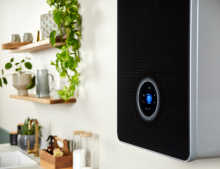Top tips to save up to £162 on your energy bills while remote working
With much of the nation still working at home, we’ve written up our six top tips to help make some big savings in the long run as an increased life at home continues.
With over half of the UK (55%) having no experience in remote working, it’s important to better understand how this could have an impact on household bills - which Ofgem average per household at £104.50 per month, or £1,254 a year. More than half of this is spent on heating and hot water, say the Energy Saving Trust.
As the world adapts to an increased life at home, we’ve pulled together our six top tips to help make you some big savings in the long run.
With every tip, Martyn Bridges – our Director of Technical Communication and Product Management, adds some further insight.

TIP 1: Identify the rooms that you work in – and operate them efficiently
The first step to success in remote working is finding the perfect working environment, without wasting energy in unused areas of your home.
The Government suggests that if you will be out of a room for less than 15 minutes, leave lights on. If you will be out of a room for more than 15 minutes, turn them off. According to Energy Saving Trust, this small change could save you £14 a year on your annual energy bills.
Martyn adds: “If you have a smart room thermostat installed with smart TRV’s, you can tailor the temperature to individual rooms. If not, think about which rooms you are likely to use and keep warm and switch off or lower the temperature on radiators in any that you don’t.”

TIP 2: Take control of your heating
If you already have a full set of heating controls, turning down your room thermostat by just one degree could save you £80 over the year - you’d barely notice the difference.
A room thermostat monitors the air temperature and enables you to set the level you want. If the room temperature drops below this level, the thermostat switches your boiler on. The recommended setting is around 21°C for comfort when at home relaxing or sitting in your temporary office. This can be more like 18°C when you’re active at home, rather than home working or sitting down relaxing.
If you’re concerned about your bills, you might be happy to know that our recent research with the Sleepyhead Clinic has shown that the ideal sleeping temperature is 17°C. Your sleep can impact your performance at work, so for best results for a smoother wake-up, Worcester Bosch and Sleepyhead Clinic recommend having the heating in your bedroom pre-set to increase in temperature 1-2 hours before you intend to wake, to help with the waking process.
Martyn adds: “If you’re thinking about the most efficient way to heat your home, it’s best to tailor it to your lifestyle. Of course, we are all currently at home for the majority of our day, so think about keeping your home comfortable, but one degree less than what you usually set it to – say 20°C. Remember that you can wear layers too to save on bills in the long run. If you don’t have smart controls and TRV’s and you are the only person in the house throughout the day, then it might be more efficient to use a portable electric fan heater for the one room you’re occupying.”

TIP 3: Be careful in the kitchen
Our recent research found that 67% of Brits like to tackle the washing up by hand at least once a day, but we fear that many may simply be washing dirty dishes under a running tap. The Energy Saving Trust estimates that using a bowl and some hot, soapy water from your trusty boiler to wash up instead could save you up to £25 a year.
Martyn adds: “I know that I drink at least five cups of tea per day at work, which will now be from home! If you’re like me, take care to only fill the kettle with the amount of water you require, to avoid the cost of re-boiling and re-filling unnecessarily to save yourself £6 a year.”
TIP 4: Stop heat escaping
You’ll be spending more time indoors, meaning you may have the heating on when you usually wouldn’t. Simple steps can be taken immediately to improve heat distribution in your home at no cost to you.
Martyn adds: “Radiators against outside walls can allow heat to escape. So, in order to prevent any further loss of heat, pull furniture slightly away from radiators to improve the circulation of air and make the radiator more efficient.
“You should also ensure you open any curtains on the south side of the house during the day, as this will increase the solar gain into the house. At night, ensure they’re all closed properly to keep out the cold.”
TIP 5: Shower smart
With more working from home, the opportunity to increase exercise levels outside is high. Previous research from Worcester Bosch has found that more than half (55%) of the nation shower within 2 hours of exercise – but we should be mindful about how and for how long we shower.
Martyn adds: “Showers take up less water than baths, so less gas is used during the process. If you want to save some money, choose showers over baths. The next time you come back from a workout, attempt to shower for one minute less than usual. Doing this will save £7 a year on your energy bills per person. So, the more people you live with, the more you could save.”
TIP 6: Change your homely habits
With extra time at home, you can look at changing some of your other inefficient habits. Outside of quick heating and hot water adjustments, there are several quick changes you can make around your working environment to further reduce costs.
For example, turning off laptop switches - and not leaving it on standby - could save you an extra £30 per year according to Energy Saving Trust, while brushing teeth or shaving with cold water would also help save further.
You can find more of our energy saving tips, or head to our YouTube channel for more.




